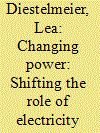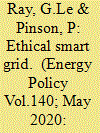|
|
|
Sort Order |
|
|
|
Items / Page
|
|
|
|
|
|
|
| Srl | Item |
| 1 |
ID:
171364


|
|
|
|
|
| Summary/Abstract |
Realizing the full potential of a smart grid is contingent on the residential users’ acceptance of new technologies and the behavioural changes that will follow their implementation. Thus, the present research attempted to gain an insight into the factors that drive residential electricity consumers, particularly those with low income, towards or away from demand side management and distributed energy resources. The results of a consumer survey of 207 Japanese households revealed that there is a clear correlation between low-household income and the willingness of the respondents to reduce their energy expenditures. In contrast, the fear of the perceived additional cost required to implement these technologies, and the belief that consumers have inadequate information or support from the utility company, prevents them from adopting new technologies. Further, the results of a comparative analysis indicate that the reputation of the utility company is higher among smart grid users than traditional electricity consumers. The K-means clustering algorithm and hierarchical cluster analysis indicated that younger and poorer members of the society faced more barriers than middle age wealthier groups. The authors maintain that the electricity utilities thus need to develop a range of measures to engage residential consumers with heterogeneous socio-economic characteristics.
|
|
|
|
|
|
|
|
|
|
|
|
|
|
|
|
| 2 |
ID:
115140


|
|
|
|
|
| Publication |
2012.
|
| Summary/Abstract |
The penetration of wind and solar generating resources is expected to dramatically increase in the United States over the coming years. It is widely understood that large scale deployment of these types of renewable energy sources (e.g., wind, solar) that have variable and less predictable production characteristics than traditional thermal resources poses integration challenges for bulk power system operators. At present, bulk power system operators primarily utilize strategies that rely on existing thermal generation resources and improved wind and solar energy production forecasts to manage this uncertainty; a host of additional options are also envisioned for the near future including demand response (DR). There are well-established bodies of research that examine variable generation integration issues as well as demand response potential; but, the existing literature that provides a comparative assessment of the two neither treats this topic comprehensively nor in a highly integrated fashion. Thus, this paper seeks to address these missing pieces by considering the full range of opportunities and challenges for mass market DR rates and programs to support integration of variable renewable generation.
|
|
|
|
|
|
|
|
|
|
|
|
|
|
|
|
| 3 |
ID:
111078


|
|
|
|
|
| Publication |
2012.
|
| Summary/Abstract |
The digitalization of the electricity grid opens the way to bundle value added services to the electricity commodity, and possibly shift business value to electricity services in line with the notions of efficiency, conservation and sustainability. In this context, market forces should be mobilized within the boundaries of energy policy goals to contribute to the massive investments that are required to fulfill the Smart Grid vision. In this paper, we present a systemic perspective aimed at establishing technical and economic synergies that may improve the business cases of individual different Smart Grid technologies and contribute to reverse the consumption-driven paradigm of the electricity sector. Our analysis is supported by evidence from applications in the electric vehicle and smart meter ecosystems. Throughout the paper, an EU (European Union) perspective is primarily considered.
|
|
|
|
|
|
|
|
|
|
|
|
|
|
|
|
| 4 |
ID:
166433


|
|
|
|
|
| Summary/Abstract |
One of the pressing legal questions of the energy transition is how to integrate “prosumers”, consumers who start producing electricity, in the electricity market. So far, their influence remains limited or fully absent because their role as independent market participants is barely or not facilitated as they are usually subject to regulated remuneration schemes. Blockchain technology offers changing the approach of “integration in the market” into “becoming the market” by enabling peer-to-peer transactions. Currently, transactions are facilitated by third parties, suppliers and system operators, whose main task is centrally compiling and coordinating information on loads and generation and contracting supply and distribution services. Instead, blockchain technology enables new ways of organising decentralised persons without the immediate need for one centrally connecting entity. This implies profound legal- and policy consequences. Based on information on first use cases of blockchain applications in the electricity sector, this article identifies those main policy implications for EU electricity law and thereby adds to the discussion how blockchain technology could facilitate “prosumers” to develop as independent market participants in the electricity sector from an energy law perspective.
|
|
|
|
|
|
|
|
|
|
|
|
|
|
|
|
| 5 |
ID:
110434


|
|
|
|
|
| Publication |
2011.
|
| Summary/Abstract |
Facing global climate change and scarce petroleum supplies, the world must switch to sustainable energy systems. While historical transitions between major energy sources have occurred, most of these shifts lasted over a century or longer and were stimulated by resource scarcity, high labor costs, and technological innovations. The energy transition of the 21st century will need to be more rapid. Unfortunately, little is known about how to accelerate energy transitions. This article reviews past transitions and factors behind them, along with their time frames. Three modern case studies are discussed: Brazil, which shifted from an oil-based transportation system to one based on sugarcane-ethanol (success); France, which shifted from oil-fired electric power to nuclear power (success); and the United States, which attempted to shift from foreign oil to a mix of domestic energy resources (failure). Lessons from these attempts to govern energy transitions are discussed. Several policy instruments to accelerate a transition are identified, though even under ideal circumstances a global energy supply transition will be very slow. Given the need to simultaneously implement programs in countries with different political economies, a greater focus on energy efficiency, promotion of Smart Grids, and possibly a new treaty should yield more timely results.
|
|
|
|
|
|
|
|
|
|
|
|
|
|
|
|
| 6 |
ID:
121348


|
|
|
|
|
| Publication |
2013.
|
| Summary/Abstract |
Utilities are increasing their investment in smart grid technologies because of the rising demand for electricity, the aging transmission and distribution infrastructure in developed countries and the need for real-time visibility of energy supply and demand to optimize service reliability and cost. Government policies are contributing to this rising investment in the smart grid in many countries around the globe. Using Rothwell and Zegveld's innovation policy framework as a starting point, this paper compares innovation policy in smart grids across the Pacific; specifically, China and the USA. This research describes the policy tools used by both countries and presents results that indicate national preferences for innovation policy that differ in the ways in which they are linked with the state of the power system. China has preferred to use "supply-side policy," which focuses on "public enterprise, scientific and technical development and legal regulation." The USA has preferred to use "environmental-side policy," which focuses on "scientific and technical development, financial, political and public enterprise." This paper also describes in detail a number of innovation policies being pursued in the smart grid industry in both China and the USA.
|
|
|
|
|
|
|
|
|
|
|
|
|
|
|
|
| 7 |
ID:
171510


|
|
|
|
|
| Summary/Abstract |
Individuals' use of smart energy technology – i.e., technology that increases energy efficiency or increases the integration of renewable energy sources – holds great potential to solve the energy-related climate problem. However, individuals' current uptake of smart energy technology is low. If policymakers are to successfully address this issue, it is vital that they understand the determinants of individuals' smart energy technology adoption. Hence, this paper provides a comprehensive adoption model for smart energy technology, including data from over 4k individuals in Europe, Asia, and North America involved in various technological contexts and phases of diffusion. A meta-analysis identifies Attitude and Performance Expectancy as the primary determinants of individuals’ smart energy technology adoption. Further, results show that Environmental Concern influences all other determinants. Implications for research and policymakers are discussed.
|
|
|
|
|
|
|
|
|
|
|
|
|
|
|
|
| 8 |
ID:
092603


|
|
|
|
|
| Publication |
2009.
|
| Summary/Abstract |
The paper focuses on presenting a proposed framework to effectively integrate the aggregated battery vehicles into the grid as distributed energy resources to act as controllable loads to levelize the demand on the system during off-peak conditions and as a generation/storage device during the day to provide capacity and energy services to the grid. The paper also presents practical approaches for two key implementation steps - computer/communication/control network and incentive program.
|
|
|
|
|
|
|
|
|
|
|
|
|
|
|
|
| 9 |
ID:
124477


|
|
|
|
|
| Publication |
2013.
|
| Summary/Abstract |
This paper provides an insight into consumer engagement in smart grid projects in Europe. Projects analysed are those included in the catalogue annexed in the JRC Report "Smart Grid projects in Europe: lessons learned and current developments". The analysis suggests an increase in the interest in consumer engagement projects at European level and a strong focus on the residential sector, and emphasises the key importance of public funding to support these projects. The study also reveals that projects involving consumers are characterised by the pursuit of two main objectives: gaining deeper knowledge of consumer behaviour (observing and understanding the consumer) and motivating and empowering consumers to become active energy customers (engaging the consumer). The paper reviews the main activities undertaken to obtain these objectives and highlights trends and developments in the field. Finally, the paper discusses obstacles to consumer engagement and the strategies adopted by the projects surveyed to tackle them, highlighting the need to build consumer trust and to design targeted campaigns taking into consideration different consumer segments. The conclusions are in line with findings and analyses presented in the literature and underscore the need for further research and action at European level.
|
|
|
|
|
|
|
|
|
|
|
|
|
|
|
|
| 10 |
ID:
127201


|
|
|
|
|
| Publication |
2014.
|
| Summary/Abstract |
India is poised to spend over USD 5.8 billion as part of the National Smart Grid Mission aimed to alleviate India's ailing power sector as part of its 12th Five year plan (2012-2017). The federal government sponsored Restructured Accelerated Power Development and Reforms Program (R-APDRP) is also focused on building ICT capability in the state electricity boards. Presently however, there is no power sector specific cyber security mandates or policies in India. The Stuxnet, Shamoon and Anonymous incidents have shown that cyber attacks can cause significant damage and pose a risk to National Critical Infrastructure. A lack of security planning as part of designing the Smart grids can potentially leave gaping holes in the country's power sector stability. The paper highlights key cyber security threats across the entire power sector value chain-from generation, to transmission and distribution. It is aimed at building the case for power sector specific cyber security regulations based on the experience of regulators in other critical infrastructure sectors like Banking and Telecom in India and power sector regulations internationally.
|
|
|
|
|
|
|
|
|
|
|
|
|
|
|
|
| 11 |
ID:
186463


|
|
|
|
|
| Summary/Abstract |
Future retail electricity markets require development to accelerate the net-zero carbon transition. Adopting a customer-centric approach to market design is necessary to fully utilise smart grid technologies. In this perspective we postulate that empowering energy consumers to become an integral component of the smart grid will lead to heightened renewable energy deployment and network flexibility.
|
|
|
|
|
|
|
|
|
|
|
|
|
|
|
|
| 12 |
ID:
132618


|
|
|
|
|
| Publication |
2014.
|
| Summary/Abstract |
The reuse of Li-ion EV batteries for energy storage systems (ESS) in stationary settings is a promising technology to support improved management of demand and supply of electricity. In this paper, MatLAB simulation of a residential energy profile and regulated cost structure is used to analyze the feasibility of and cost savings from repurposing an EV battery unit for peak-shifting. in situ residential energy storage can contribute to the implementation of a smart grid by supporting the reduction of demand during typical peak use periods. Use of an ESS increases household energy use but potentially improves economic effectiveness and reduces greenhouse gas emissions. The research supports the use of financial incentives for Li-ion battery reuse in ESS, including lower energy rates and reduced auxiliary fees.
|
|
|
|
|
|
|
|
|
|
|
|
|
|
|
|
| 13 |
ID:
150721


|
|
|
|
|
| Summary/Abstract |
Customers, utilities, and society can gain many benefits from distributed energy resources (DERs), including plug-in hybrid electric vehicles (PHEVs). Using battery on PHEV to arbitrage electricity price is one of the potential benefits to PHEV owners. There is, however, disagreement on the magnitude of such profit. This study uses a stochastic optimization model to estimate the potential profit from electricity price arbitrage of two types of PHEVs (PHEV-10, and PHEV-40) under three scenarios with variant electricity tariff and PHEV owners over a five-year period.
|
|
|
|
|
|
|
|
|
|
|
|
|
|
|
|
| 14 |
ID:
125500


|
|
|
|
|
| Publication |
2013.
|
| Summary/Abstract |
In discussions on smart grids, it is often stated that residential end-users will play a more active role in the management of electric power supply and demand. They are expected to shift from a passive role as consumer of electricity to an active role as co-provider. In this article, the extent to which current technologies, products and services empower end-users to take up an active role as co-providers is evaluated. Based on a review of literature and related pilot projects, current approaches were found to be driven by technical and financial considerations. There appears to be a lack of product and service design that supports end-users in their role as co-providers in a smart grid. This is reflected in the lack of thought given to how the end-users' process of behavioral change can be supported to enable the transition from consumer to co-provider. Several recommendations are provided for product and service designers towards fostering the role of co-provider, which comes under under: (a) user interaction needs, (b) approaches to behavioral change and (c) community initiatives and management of resources. Designers are considered to play a bridging role between policy making and engineering, while facilitating involvement of end-users in the design process.
|
|
|
|
|
|
|
|
|
|
|
|
|
|
|
|
| 15 |
ID:
149873


|
|
|
|
|
| Summary/Abstract |
The transition from fossil fuels to renewable resources is highly desirable to reduce air pollution, and improve energy efficiency and security. Many observers are concerned, however, that the diffusion of systems based on renewable resources may give rise to energy sprawl, i.e. an increasing occupation of available land to build new energy facilities of this kind. These critics foresee a transition from the traditional fossil-fuel systems, towards a renewable resource system likewise based on large power stations and extensive energy grids. A different approach can be taken to reduce the risk of energy sprawl, and this will happen if the focus is as much on renewable sources as on the introduction of distributed renewable energy systems based on micro plants (photovoltaic panels on the roofs of buildings, micro wind turbines, etc.) and on multiple micro-grids. Policy makers could foster local energy enterprises by: introducing new enabling rules; making more room for contractual communities; simplifying the compliance process; proposing monetary incentives and tax cuts. We conclude that the diffusion of innovation in this field will lead not to an energy sprawl but to a new energy system characterized by a multi-layered density: a combination of technology, organization, and physical development.
|
|
|
|
|
|
|
|
|
|
|
|
|
|
|
|
| 16 |
ID:
176747


|
|
|
|
|
| Summary/Abstract |
The European Union is implementing ambitious programs to tackle energy efficiency, energy independence, and climate change challenges. To reach the 20/20/20 targets, the EU aims at modernizing power grids to make them ‘smart’ by collecting close to real-time data and subsequently operate grids more optimally. One of the smart grid purposes is to integrate a growing share of renewable generation while efficiently accommodating their variability and limited predictability through the actuation of consumer flexibility. Hence, the success of energy programs relies on customer involvement in altering their energy consumption through the use of analytics and incentive-based demand-side management. The rollout of smart meters throughout Europe should provide the necessary information to implement them. This is without accounting for a possible backlash of customers in response to bad practices of utilities when it comes to digitization and smart meter rollout, also associated with the potential distrust of digital products. Beyond legal binds and technical obstacles, the possible ways of handling the rollout of smart meters and metering, which defines the relationship between customers and utilities, are multiple. However, only the practices that exhibit ethical behavior of the utilities towards customers, and consider them as stakeholders in smart grids will lead to a fruitful and long-lasting relationship between customers and utilities.
|
|
|
|
|
|
|
|
|
|
|
|
|
|
|
|
| 17 |
ID:
150066


|
|
|
|
|
| Summary/Abstract |
Classical deterministic models applied to investment valuation in distribution networks may not be adequate for a range of real-world decision-making scenarios as they effectively ignore the uncertainty found in the most important variables driving network planning (e.g., load growth). As greater uncertainty is expected from growing distributed energy resources in distribution networks, there is an increasing risk of investing in too much or too little network capacity and hence causing the stranding and inefficient use of network assets; these costs are then passed on to the end-user. An alternative emerging solution in the context of smart grid development is to release untapped network capacity through Demand-Side Response (DSR). However, to date there is no approach able to quantify the value of ‘smart’ DSR solutions against ‘conventional’ asset-heavy investments. On these premises, this paper presents a general real options framework and a novel probabilistic tool for the economic assessment of DSR for smart distribution network planning under uncertainty, which allows the modeling and comparison of multiple investment strategies, including DSR and capacity reinforcements, based on different cost and risk metrics.
|
|
|
|
|
|
|
|
|
|
|
|
|
|
|
|
| 18 |
ID:
113424


|
|
|
|
|
| Publication |
2012.
|
| Summary/Abstract |
This paper examines the motivations, processes and outcomes of the development of smart grids in South Korea through the perspectives of governance and innovation systems. Drawing on desktop research and semi-structured interviews, this paper has two major findings. First, the development of smart grids in Korea has been shaped by various factors including macroeconomic policy, the role of the government, and experimentation. The complex interactions between these factors at the landscape, regime and niche levels has impacted on the development of smart grids. Second, while Korea's government-led approach has its strengths in driving change, it has also exposed weaknesses in the country's ability to mobilise the private sector and consumer participation. Major obstacles including partial electricity market reform and public distrust exist. A systemic perspective is needed for policy in order to accommodate the changes required for smart grid development. Regulatory reforms, particularly price-setting mechanisms, and consumer engagement are priority areas for policy change.
|
|
|
|
|
|
|
|
|
|
|
|
|
|
|
|
| 19 |
ID:
150073


|
|
|
|
|
| Summary/Abstract |
Grid operators increasingly have to collaborate with other actors in order to realize smart grid innovations. For routine maintenance, grid operators typically acquire technologies in one-off transactions, but the innovative nature of smart grid projects may require more collaborate relationships. This paper studies how a transactional versus relational approach to governing smart grid innovation projects affects incentives for other actors to collaborate. We analyse 34 cases of smart grid innovation projects based on extensive archival data as well as interviews. We find that projects relying on relational governance are more likely to provide incentives for collaboration. Especially non-financial incentives such as reputational benefits and shared intellectual property rights are more likely to be found in projects relying on relational governance. Policy makers that wish to stimulate smart grid innovation projects should consider stimulating long-term relationships between grid operators and third parties, because such relationships are more likely to produce incentives for collaboration.
|
|
|
|
|
|
|
|
|
|
|
|
|
|
|
|
| 20 |
ID:
113479


|
|
|
|
|
| Publication |
2012.
|
| Summary/Abstract |
This paper presents an optimal load management strategy for residential consumers that utilizes the communication infrastructure of the future smart grid. The strategy considers predictions of electricity prices, energy demand, renewable power production, and power-purchase of energy of the consumer in determining the optimal relationship between hourly electricity prices and the use of different household appliances and electric vehicles in a typical smart house. The proposed strategy is illustrated using two study cases corresponding to a house located in Zaragoza (Spain) for a typical day in summer. Results show that the proposed model allows users to control their diary energy consumption and adapt their electricity bills to their actual economical situation.
|
|
|
|
|
|
|
|
|
|
|
|
|
|
|
|
|
|
|
|
|